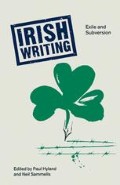Abstract
Gender works in its most subversive ways at the boundaries of Joyce’s texts: in the terminal settings of Dubliners stories, in the female-voiced codas of Ulysses and Finnegans Wake, and on the geographic borders of Ireland. Such border situations include the placement of a character on a beach, as in the fourth chapter of A Portrait of the Artist as a Young Man and the ‘Proteus’ and ‘Nausicaa’ chapters of Ulysses, and mental transport to the West, as occurs at the end of ‘The Dead’. Both Dubliners stories and Ulysses deliberately shift between territories identified with either the masculine or the feminine, assuming gender-related languages associated with these places.1 It is in feminine territory that male characters are least able to hold to patriarchal values, and it is at the terminal borders of his texts that Joyce seems to have felt the need for a feminine voice.
Access this chapter
Tax calculation will be finalised at checkout
Purchases are for personal use only
Preview
Unable to display preview. Download preview PDF.
Notes
For further discussion see B. K. Scott, James Joyce (Brighton: Harvester, 1987) ch. 3: ‘Gender Discourse and Culture’.
E. Showalter, ‘Feminist Criticism in the Wilderness’, in E. Showalter (ed.), The New Feminist Criticism: Essays on Women, Literature and Theory (New York: Pantheon, 1985) pp. 243–70.
M. Jehlen, ‘Archimedes and the Paradox of Feminist Criticism’, Signs 6 (Fall 1981) 582.
J. Kristeva, ‘From “Oscillation between Power and Denial”’, tr. M. A. August, in E. Marks and I. de Courtivron (eds), New French Feminisms: An Anthology (New York: Schocken Books, 1981) p. 165.
J. Joyce, Selected Letters, ed. R. Eilmann (New York: Viking Press, 1975) p. 285.
M. French, The Book as World (Sphere, 1982) p. 259.
See C. Van Boheemen, The Novel as Family Romance: Language, Gender, Authority from Fielding to Joyce (Ithaca, NY: Cornell University Press, 1987) p. 177ff;
and R. Battaglia, ‘Stages of Desire in Joyce’, in B. K. Scott (ed.), New Alliances in Joyce Studies: ‘whan it’s aped to foul a Delfian’ (Newark, Del.: University of Delaware Press, 1988) pp. 37–47.
M. Seidel, Epic Geography: James Joyce’s ‘Ulysses’ (Princeton, NJ: Princeton University Press, 1976).
For a discussion of women in urban geography, and a survey of attitudes toward the mythic parallels, see S. Benstock, ‘City Spaces and Women’s Places in Joyce’s Dublin’, in B. Benstock (ed.), James Joyce: The Augmented Ninth (Syracuse, NY: Syracuse University Press, 1988).
See B. K. Scott, ‘Appraisals: Thomas Kettle, 1880–1916’, Journal of Irish Literature 3 (1974) 74–91. Kettle’s struggles over Irish nationalism corresponded to Joyce’s, and sympathy for the small country of Belgium cost him his life in the First World War. B. Ghiselin, ‘The Unity of Joyce’s Dubliners’, in Scholes and Litz, Dubliners: Text, Criticism and Notes pp. 320, 329, 320, 318.
S. A. Henke, ‘Stephen Dedalus and Women: A Portrait of the Artist as a Young Misogynist’, in S. A. Henke and E. Unkeles, Women in Joyce (Urbana: University of Illinois Press, 1982) p. 93.
J. Joyce, ‘Epiphany 28’, in R. Scholes and R. M. Kain (eds), The Workshop of Daedalus (Evanston, Ill.: Northwestern University Press, 1965).
Editor information
Editors and Affiliations
Copyright information
© 1991 The Editorial Board, Lumiere (Co-operative) Press Ltd
About this chapter
Cite this chapter
Scott, B.K. (1991). James Joyce: a Subversive Geography of Gender. In: Hyland, P., Sammells, N. (eds) Irish Writing. Insights. Palgrave Macmillan, London. https://doi.org/10.1007/978-1-349-21755-7_11
Download citation
DOI: https://doi.org/10.1007/978-1-349-21755-7_11
Publisher Name: Palgrave Macmillan, London
Print ISBN: 978-0-333-52542-5
Online ISBN: 978-1-349-21755-7
eBook Packages: Palgrave Literature & Performing Arts CollectionLiterature, Cultural and Media Studies (R0)

